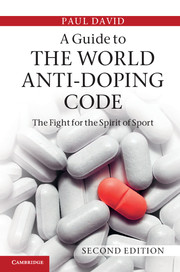Book contents
- Frontmatter
- Contents
- List of Figures
- Preface to the Second Edition
- Table of Cases
- Introduction
- 1 The development of principles relating to anti-doping regimes: the role of the Court of Arbitration for Sport
- 2 Overview of the Code and the World Anti-Doping Program
- 3 The International Standards in more detail
- 4 The nature of the Code and its interpretation and application
- 5 Articles 1 and 2 of the Code: anti-doping rule violations under the Code
- 6 Article 3 of the Code: the proof of anti-doping rule violations under the Code
- 7 Responsibility for testing and investigations, results management and hearings
- 8 Articles 9 and 10 of the Code: sanctions for anti-doping rule violations
- 9 Article 13: appeals under the Code
- 10 Appeals to the Swiss Supreme Court from CAS, challenges to the Code in the courts and claims outside the Code
- 11 The way ahead: review of the 2009 Code
- Index
- References
3 - The International Standards in more detail
Published online by Cambridge University Press: 05 February 2013
- Frontmatter
- Contents
- List of Figures
- Preface to the Second Edition
- Table of Cases
- Introduction
- 1 The development of principles relating to anti-doping regimes: the role of the Court of Arbitration for Sport
- 2 Overview of the Code and the World Anti-Doping Program
- 3 The International Standards in more detail
- 4 The nature of the Code and its interpretation and application
- 5 Articles 1 and 2 of the Code: anti-doping rule violations under the Code
- 6 Article 3 of the Code: the proof of anti-doping rule violations under the Code
- 7 Responsibility for testing and investigations, results management and hearings
- 8 Articles 9 and 10 of the Code: sanctions for anti-doping rule violations
- 9 Article 13: appeals under the Code
- 10 Appeals to the Swiss Supreme Court from CAS, challenges to the Code in the courts and claims outside the Code
- 11 The way ahead: review of the 2009 Code
- Index
- References
Summary
The role of International Standards
The Code functions together with the WADA International Standards and various Guidelines or Models of Best Practice which may be adopted by anti-doping organisations, in relation to the processes contained in the Standards. Guidelines are not mandatory, whereas Signatories must apply and comply with the International Standards in order to fulfil their obligations under the Code. The Standards are an indispensable part of the regime under the Code, and the Articles of the Code make direct reference to them where testing, the analysis of samples to prove doping, the designation of Prohibited Substances and Methods and the grant of Therapeutic Use Exemptions are referred to. The most obvious example of the essential role of the Standards would be the violation of doping under Article 2.1. Testing for a prohibited substance has to be carried out in conformity with the International Standard for Testing (Article 5.2 Code). The sample obtained has to be analysed by a WADA laboratory accredited under the International Standard for Laboratories if doping is to be established (Article 6.1 and notes to Code). There can only be a doping violation if a prohibited substance or method designated under the Prohibited List is detected, and on review of a positive test, the anti-doping organisation responsible for result management will have to ascertain whether the substance detected is subject to a Therapeutic Use Exemption granted under the International Standard for Therapeutic Use Exemptions.
In many important areas, the Code provides the general framework, while the Standards provide the detail. An anti-doping organisation which agrees to the Code, and an athlete or other person who is bound to it, will agree to the application of both the Code and the Standards. Non-compliance will mean that a party is in breach of its obligations under the Code. The consequence will depend on the particular circumstances, but non-compliance may mean that an anti-doping organisation cannot establish that the process has been carried out which is necessary to prove an anti-doping rule violation or that an athlete or other person has committed an anti-doping rule violation.
- Type
- Chapter
- Information
- A Guide to the World Anti-Doping CodeA Fight for the Spirit of Sport, pp. 78 - 121Publisher: Cambridge University PressPrint publication year: 2013

